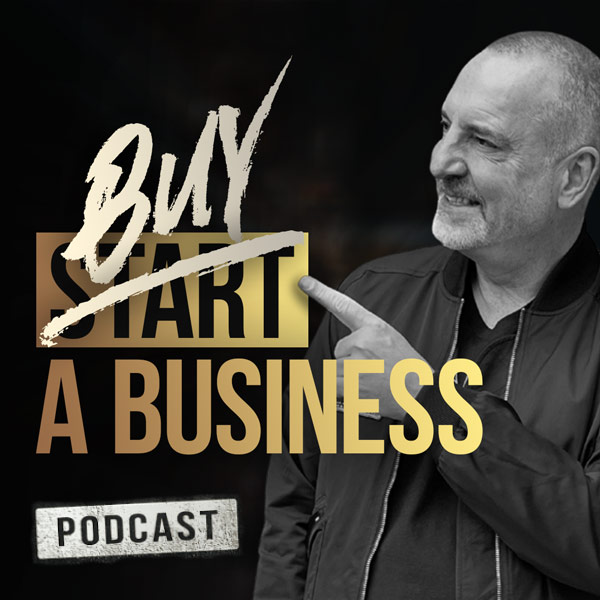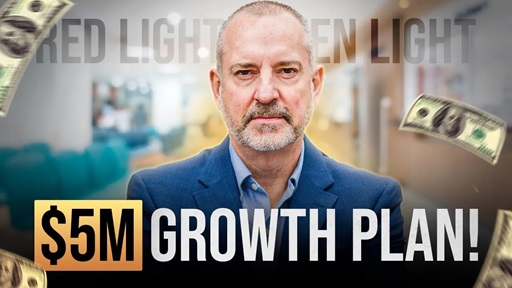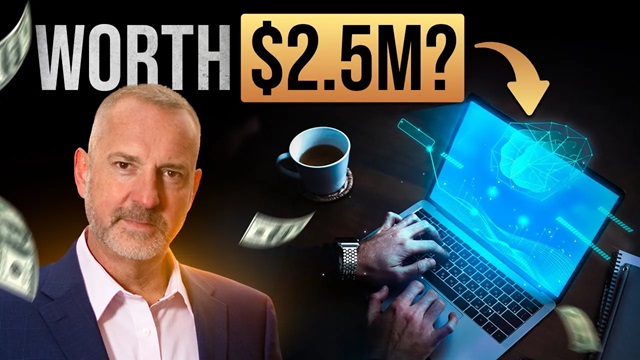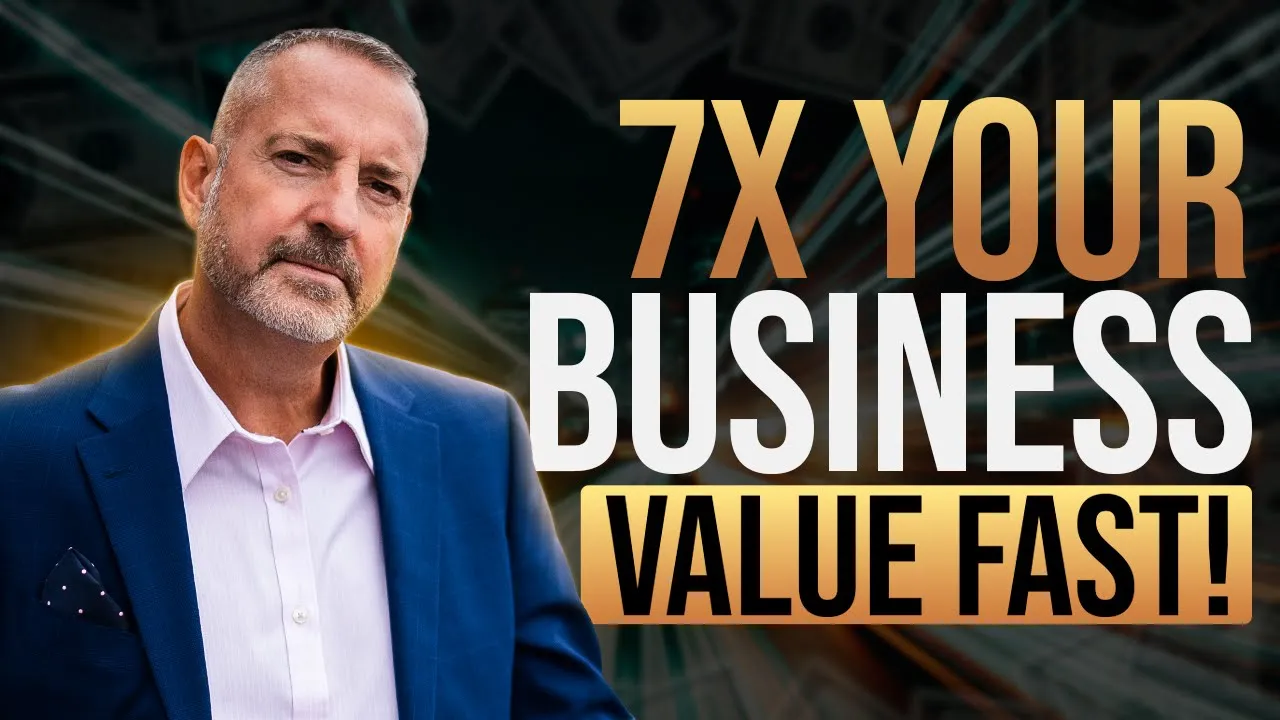The Entrepreneur’s Guide: Why Buy a Business? Pt 2
The Entrepreneur’s Guide: Why Buy a Business? Pt 2
Carl Allen explores the contrasting psychology of business owners and how it affects business acquisition deals. He presents two identical businesses in terms of operations, financials, and structure but emphasizes the major difference: the mindset of their owners. The first owner, happy and thriving, demands a higher price and upfront cash for his business, while the second, who is distressed or burnt out, is willing to negotiate a more favorable deal with flexible payment terms for the buyer.
Carl stresses the importance of having a clear “buy box” before entering the business acquisition market. A buy box includes three key elements: buying within your area of expertise, targeting motivated sellers of profitable businesses, and focusing on businesses with strong cash flow. The buy box helps narrow the enormous number of potential acquisitions and ensures you find the right fit based on your capabilities and goals.
He also dispels common myths about buying businesses, such as needing a lot of personal money or experience. Carl reveals that through leveraged buyouts (LBOs) and seller financing, it’s possible to acquire a business with little to no personal capital. He shares that finding off-market deals through relationships and networking is often more effective than relying on publicly listed businesses for sale.
Carl emphasizes the importance of mindset, relationships, and consistency in deal-making. Just like building muscle in the gym requires routine and discipline, buying businesses successfully comes from consistently pursuing deals, meeting sellers, and making offers. By following a structured process, anyone can eventually succeed in buying businesses.
Lastly, Carl introduces different deal structures like seller financing, bolt-on acquisitions, and consulting for equity. He discusses how these methods can be tailored to create highly profitable opportunities, often with minimal investment, providing real-world examples, including a 21-year seller-financed deal he closed with his business partner, Chris.
Full Transcript:
Just think about this for one second. Imagine you’ve got two businesses, but they’re absolutely identical. They do the same product or service. They’re in the same town.
They’ve got the same employees, same customers, and the same financial profile. So they’ve got revenues, profits, assets. Everything’s identical. The only thing that’s different in that business is the owner.
But more importantly, the owner’s seller’s psychology. So take the business owner on the left, entrepreneur in his 30s, happy, having a lot of fun. Now, every business is for sale.
It’s just a question of how much. Right? If you had three trillion dollars today, you can go and buy Amazon. Every business is for sale.
It’s a question of price and terms. So the guy on the left, he’s probably going to think, well, I love this business. I’m having a lot of fun. I’ve got no seller distress.
I’ll sell, but I I want a five times multiple of profit. Most businesses are worth a multiple of their profitability. It’s called EBITDA.
He might want a five x multiple, and then he might want eighty percent of that total cash at closing. So let’s say he’s doing a million dollars in cash flow, five million dollars purchase price. He wants four million dollars at the closing table. Now, the good news is there’s a deal structure to allow you to do that.
It’s called the SBA seven loan. But and those deals are great. I’ve done loads of those deals. People in the room have done loads of those deals.
But really, we want the deals. We want the guy on the right. So it’s the same business, remember, that’s doing a million bucks in cash flow, but he wants to retire. He’s not having a lot of fun, doesn’t know how to sell.
He’s distressed. He’s burnt out, could be sick, could be even dying in some cases.
He’s going to sell for a two to three times multiple.
And he’s going to let you pay for that business over a long period of time. So he might take eighty percent or even one hundred percent of that purchase price over a five, ten, even twenty year period.
My business partner, Chris, and I, we just negotiated a seller financing on a marketing agency, twenty one year seller financing deal, zero money down, because he was the guy on the right distressed, burnt out, frustrated, doesn’t want to do this anymore.
So one of the key things that you must start off with when you’re buying businesses is determining what is your buy box. So your buy box is really, really important. Imagine it for a second. There’s two million businesses in the United States. Right? And there’s only a couple of hundred thousand people that really know how to do this. So you’ve got all this opportunity.
It’s like I walked past FAO Schwarz in New York yesterday, and I see all the little kids running in and going crazy thinking, woah, look at all this stuff. It’s like that unless you’re going into the toy shop knowing exactly what’s in your buy box. And your buy box should always have three things. Now my buy box is going to be very, very different to Mark’s buy box. It’s going to be very, very different to Nathan’s buy box. It’s going to be very, very different to Michael Herbus’s buy box.
But your buy box always has to have three things. Number one, you’ve got to stay in your lane. You’ve got to buy a business that you know something about, you’re passionate about. You can add a lot of value to that business post closing as an owner investor.
And if you find a deal and you can’t do that, just go and partner with somebody that can add that sector expertise into your mix. Really, really important. You’re going to learn about that all this weekend. And again, sticking in this half a mil to ten mil or one to five million dollars revenue range.
And the other thing that you’ve got to realize as well, and I touched on it before, is you don’t have to work in the business that you buy.
So one of you some of you guys will think, well, you know what? I want to be an owner manager. I want to buy a business. I want to go in, and I want to operate it day to day.
There’s nothing wrong with that. There’s absolutely nothing wrong with that. I don’t do that because I can’t be in seventeen different places at once. And I certainly couldn’t be here this weekend coaching you guys.
But if you want to be an owner investor, you can buy multiple businesses and then partner with people that will run those businesses for you. So the sector requirements are really important. The second thing that’s got to be in your buy box is ideally look for what I call a distressed seller of a good business. Not the other way around.
There’s lots of good sellers of distressed businesses. A distressed business is a business that’s not generating cash flow. You want to typically stay away from those. A distressed seller is somebody that owns a cash flowing business, but for all the reasons we talked about, needs to get out.
They want to retire. They want to go and do something else. So their motivation to exit, which is the industry term for when you come out of a deal, their motivation to exit is really, really high. The higher that is matched to the strength of the relationship you build, not only it could be cheaper to buy the business, but you can be a lot more creative in terms of the deal structure that you put around.
And then the third thing that you need to have is some financial DNA.
If the business has got assets, great.
But really, all it needs is cash flow. If the business has got cash flow, you can finance that acquisition with no money out of niche. It’s about your experience. It’s about your passion. And it’s about your ability to add some kind of value to that business once you’ve bought it. Because buying businesses is really easy.
It’s really, really easy. Once you’ve bought a business, though, it’s like, what do you do with it? You’ll find out that you make most of your money on a deal when you exit. You buy a business, you scale it up, and you sell.
That’s when you make the bulk of the money. So buy businesses that you care about, and you can help move the needle. Motivated sellers are really, really strong. And it’s got to have some financial DNA.
It’s got to have things like cash flow.
That is king. If the business doesn’t cash flow, number one, you’re not going to make any money out of it. And number two, it’s going to be really tough to get financing to buy it. Although, if the business isn’t cash flowing, it’s typically worth one dollars anyway.
So there are a lot of common myths about buying businesses. People think you need to have tons and tons of money in your own personal bank account. You don’t. I never, ever, ever put my own money into deals. I’m doing a billion dollar roll up right now in the e commerce space. Some of you in the room are investors in that deal with me.
I’ve put zero money into that deal. Zero. I’m using other people’s money to do it. A lot of people think that if a business is for sale, it must be a terrible business.
You know, what are they not telling me? It’s not. We talked about baby boomers. They’ve all got great businesses.
When you get their tax returns, if it’s cash flowing, you know it’s a good business.
We talked before about having management skills. People think, well, I’ve never run a business before. I don’t know how to manage people. I’m the worst manager in the world.
If I was the general manager of a business, it would die within twenty four hours. I’m a leader. I’m a visionary. You can partner with people that can run those businesses for you and do that day to day work.
A lot of people think that you’ve got to know everything about the business. You don’t. You’ve just got to have a smart, capable team, a middle management layer in that deal that can do all of those different things. Do you think Jeff Bezos knows how to do R and D? No, he doesn’t. He’s a leader. He’s got people inside of the business that can do all that for him.
People think that you’ve got to buy one hundred percent of a business. You don’t have to. You can buy one percent of a business. Ideally, you want to have a majority share, which would be seventy five percent.
A lot of people think, you know what? I want this deal, but I need some better people. I can’t afford top level employees. You can.
You’re buying the business for none of your own personal money. You have equity in your business that you can offer to people to bring them in. Every time I do a deal, I give my general manager equity in that business. Then they’re my partner.
So they’re going to burst through brick walls for me. They’re like I turn them into a marine. They’re going to kill themselves to make that business successful because they’re now my partner. They don’t want to let me down.
You’re changing the psychology and the mindset of the people that you’re partnering with.
A lot of people think you can only buy businesses that are listed online. That’s the biggest myth of them all, is how to find off market deal flow, how to use LinkedIn, how to write letters directly to sellers, how to build relationship networks.
I recently joined the Sub2 program. I didn’t I could even spell Sub2 in real estate. Real estate is not my thing. I just bought two houses in Orlando.
I didn’t go to Zillow.
I was part of a community. I put my buy box in that community.
I got sixty three deals within twenty five hours. And I bought two of those deals with virtually no money out of pocket. So building networks, getting into rooms like this, meeting your fellow dealmakers, that’s where you’re going to get deal flow. And a lot of people think you need to have great credit to buy a business.
If you’re doing an SBA seven loan, you do. We’ll talk about that tomorrow. But a lot of the times, if you’re doing a seller financing deal, the seller doesn’t care about your credit. He just wants to sell the business, and he wants to know that you’re the right person to take that business forward to the next level.
And there are three major skills that you need to master to crush this as a deal maker. The first one is your mindset. Really, really important, how to think differently.
The second thing that you need to do is you need to get into the habit of building relationships.
This is a relationship business. This isn’t Wall Street where I grew up, and I was there yesterday reminiscing.
When you’re doing billion dollar deals on Wall Street, which I’ve done in the past, it’s all about financial engineering. You’re buying a two million dollars engineering company in in Punxsutawney, Pennsylvania.
It’s about relationships.
It’s about rapport. And then the third thing is about being intentional. It’s about being routined. It’s about continually doing the things you need to do to be successful.
It’s like going to the gym. If you want to build muscle, you want to go to the gym, as long as you go there three or four times a week and you do the reps and the sets and then you eat properly and drink plenty of water, it’s biologically impossible for you not to build muscle. Deal making’s the same. If you’re going out there, you’re originating deals, you meet sellers, and then you make offers on those deals, if you’re consistently doing that week in, week out, you biologically can’t fail to buy a business.
Right? This applies to everything in life. Execution trumps knowledge every single time. So you’ve got to do the work really, really important.
Let’s quickly look at the seven deal types. So your first deal, which is an LBO, you can do something called an SBA deal. We can do annuity deals, which is long term seller financing deals. No external capital required at all.
You can do things called bolt ons or tuck ins or roll up deals. You can merge businesses together. So if Ali owned a business and Mark owned a business and they’re in complementary sectors, they could combine their businesses together and generate lots of synergies. You can do consulting for equity deals.
So you might think, well, you know what? I don’t want to own a business. But I’m happy to be a partner in a business, add my strategic value, and take it forward. And maybe I’ll do ten of those and have a portfolio.
And then, hands up if you’re in sub two. You’re a real estate.
Okay. So what’s really interesting in the real estate world is there’s this term called wholesaling, which I’ve got to tell you, a year ago, I didn’t even know what that meant. I wasn’t a real estate guy. So wholesaling is where somebody goes and finds a deal, puts it under contract, and then sells it to you and gets a fee, probably five thousand dollars ten thousand dollars twenty thousand dollars I’m going to show you how you can wholesale business deals and make millions, make a percentage of the cash flow for five, ten, fifteen, twenty years.
So an LBO, what a leveraged buyout stands for it’s a Wall Street term. That’s where I’ve come from. A leveraged buyout is simply buying a business using other people’s money. And leverage typically is associated with debt.
So you’re borrowing money that the business’s cash flow over time is going to repay. And a great example of this and any soccer fans in the house? I’m a huge soccer fan. So not many.
I’m in the wrong room, aren’t I? So soccer so Manchester United, probably one of the biggest clubs in the world, big club in the UK. They were bought by the Glazer family, who own the Tampa Bay Buccaneers.
They bought that business for one point four billion dollars in two thousand and five, put none of their own money in. They’d been in my program. They’d figured out how to do it. They bought that business.
They still owe about half a billion dollars of debt, but they’re about to sell it for seven point two billion dollars or six point seven billion dollars when they repay that debt. So they’ve just they’re going to make a six point seven billion dollars profit from that deal without putting in any of their own money. And one of the things that investors talk about a lot is return on investment. Well, if you’re not putting any money into a deal and then you’re profiting from that, your ROI is infinity.
If you divide your profit divided by what you’ve invested, if what you’ve invested is zero, any number divided by zero is actually infinity.
So there’s a lot of benefits to leverage buyouts. But the basic structure of an LBO is the total value of the deal has three components. Number one, you’ll inherit the existing liabilities.
Number two, in some cases, but not all, there might be a closing payment. So you’re borrowing money from assets or investors to put money down at close. And then some of the deal is going to be seller financing and or something called an earn out, which is a bonus payment. And then I touched on this before.
There’s three ways to make money when you’re doing a deal. The first time is you can, but not always, take some cash off the closing table. So if you buy a business and let’s say the seller wants one hundred thousand dollars down and you raise two hundred thousand dollars in financing, now you’re the owner of that business directly after close. You can take that money out and do whatever you want with it.
Buy a house, buy a car, buy another business. It’s your money. And then as the owner of that business, once you’ve done the debt service, so you’ve paid the payments to the bank or the investor or whoever, whatever cash flow is left in that business, and we show you how to forecast and calculate that so you’re making money, all that free cash flow is your money because you’re the owner of the business.




